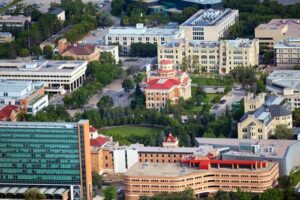
In recent years, the tranquil lands of Bawjiase have been under siege by a destructive force – illegal sand mining. This clandestine activity, carried out without permits from the government, has left a trail of devastation in its wake, irreversibly altering the landscape and threatening the livelihoods of local communities.
Located in the central region of Ghana, Bawjiase is known for its lush vegetation, fertile soils, and vibrant local culture. However, the rampant illegal sand mining taking place in the area has put all these at risk. The unregulated extraction of sand from riverbeds, floodplains, and other natural habitats has led to severe environmental degradation, including erosion, loss of biodiversity, and destruction of water sources.
Without proper oversight and regulation, illegal sand mining operations in Bawjiase have been allowed to flourish, driven by a combination of greed and lack of enforcement. The perpetrators often exploit vulnerable communities, offering quick cash in exchange for access to their lands. In the short term, this may seem like a boon to locals struggling with poverty, but the long-term consequences are dire.
The ecological impact of illegal sand mining is undeniable. By disrupting natural ecosystems and altering the flow of rivers, these activities harm wildlife habitats and disrupt the balance of local ecosystems. Moreover, the removal of sand can lead to increased flooding, as riverbanks are left unprotected and unable to absorb excess water during heavy rains.
Beyond the environmental damage, the socio-economic consequences of illegal sand mining in Bawjiase are equally concerning. Local farmers find their lands stripped of topsoil, rendering them infertile and unproductive. Water sources become contaminated with silt and pollutants, affecting both human health and agricultural practices. The once-thriving community is now grappling with the loss of their natural resources and the prospect of a bleak future.
Efforts to curb illegal sand mining in Bawjiase have so far been insufficient, with enforcement agencies struggling to rein in rogue operators. It is essential for the government to step up its efforts to regulate and monitor sand mining activities in the area, ensuring that permits are obtained and environmental safeguards are implemented.
Additionally, there is a need for greater awareness and education among local communities about the repercussions of illegal sand mining. By empowering residents to understand the importance of preserving their natural environment, they can become advocates for sustainable land management practices and guardians of their land for future generations.
In conclusion, the wanton destruction caused by illegal sand mining in Bawjiase is a stark reminder of the urgent need for intervention. It is imperative that government authorities, environmental agencies, and the community work together to put an end to this destructive practice and safeguard the precious lands of Bawjiase for the prosperity of all. Only through collective action and a commitment to sustainable development can we hope to restore and protect the beauty and integrity of this cherished region.
Author
Papa Kwasi Dentsil-Koomson (MCS, CMSC, BC, BF) is the CEO / MD of Mineserve Engineering Ghana Limited (MEGL) and Managing Member of Great Nevada Oil & Gas Exploration LLC, USA. He is also a certified Private Investigator, Counter Terrorism & International Relation Professional.
His expertise includes engineering & construction project management, oil & gas industry operations, markets & drilling, risk analysis and economic crime investigations with over 15 years of experience.





